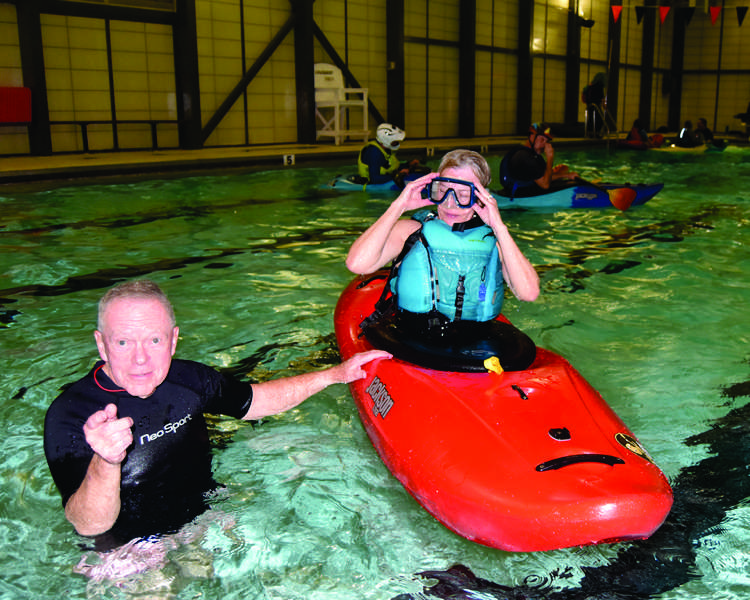Kayakers can learn how to ‘roll’ at Clinton’s indoor swimming pool

East Tennessee Whitewater Club instructor Sam Suffern gives kayaking lessons to Linda Wills in the Clinton indoor pool at the Community Center. (photo:Ben Pounds )
Some participants take lessons, while others practice rolling, paddling, and steering on their own.
Under the glow of the pool’s indoor lights, the group hones skills they’ll use to tackle rougher waters when warmer weather arrives.
“This is what I love to do,” said longtime whitewater kayaker Sam Suffern of the Oak Ridge-based East Tennessee Whitewater Club. He oversees the club’s roll practice program, held Wednesdays from 5:30 to 7:30 p.m. at the Clinton Community Center’s indoor pool, 101 S. Hicks St., through May 17.
The cost is $5 for adults and $3 for participants under 18, but participants must also be club members.
Membership costs $20 per family.
Suffern, 82, has paddled since 1976, and remembers a time when enthusiasts like himself made their own fiberglass kayaks.
Modern kayaks, he said, are sturdier. and are produced by companies such as Tennessee-based Dagger.
“Whitewater is where rivers are fast enough that they make frothy waves,” he said.
He described East Tennessee as “whitewater heaven” because of its abundance of rivers ideal for the sport.
Practicing rolling skills is essential for whitewater kayakers, Suffern said.
“What we’re doing here is polishing our skills and teaching others who don’t know how,” he said.
Suffern cited two reasons he loves whitewater kayaking:
“One, it’s an exciting, intense sport,” he said.
“The second thing is that being out on a whitewater river is being totally immersed in nature. In that sense, it’s almost a spiritual experience. You come close to nature. You come close to, if you will, the laws that God put in place that run this whole universe.”
Roll practice allows kayakers to work on flipping their boats back upright in a controlled environment, a skill that saves “an enormous amount of trouble, risk and time,” Suffern said.
It requires regular practice, as it’s more complex than riding a bicycle.
In the spring, kayakers can join clinics offered by the East Tennessee Whitewater Club or the Chota Canoe Club.
These sessions teach participants how to maneuver their boats, read the water, and use the river’s surface to navigate.
“Or you could just get a boat, go out, and crash and burn a few times; it’s not anywhere near as peaceful,” Suffern joked.
He emphasized that whitewater kayakers should know how to swim and feel comfortable in the water.
“A lot of people think that people who do this are wild and crazy risk-takers,” he said. “But there’s an expression we have in the world of kayaking: There are old kayakers, and there are bold kayakers, but there are no old bold kayakers.
“We run our rivers not just chaotically, but with a plan,” Suffern said, noting that scouting the water and planning a route are crucial.

